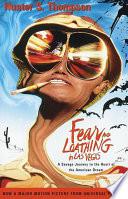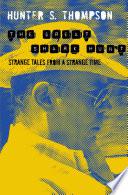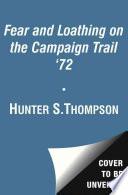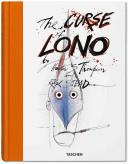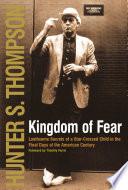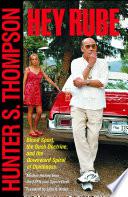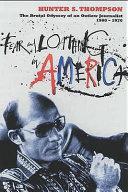“I drink much less than most people think, and I think much more than most people would believe.”
Source: Proud Highway: Saga of a Desperate Southern Gentleman, 1955-1967
Hunter Stockton Thompson was an American journalist and author, and the founder of the gonzo journalism movement. Born in Louisville, Kentucky, to a middle-class family, Thompson had a turbulent youth after the death of his father left the family in poverty. He was unable to formally finish high school as he was incarcerated for 60 days after abetting a robbery. He subsequently joined the United States Air Force before moving into journalism. He traveled frequently, including stints in California, Puerto Rico, and Brazil, before settling in Aspen, Colorado, in the early 1960s.
Thompson became internationally known with the publication of Hell's Angels: The Strange and Terrible Saga of the Outlaw Motorcycle Gangs . For his research on the book he had spent a year living and riding with the Angels, experiencing their lives and hearing their stories first-hand. Previously a relatively conventional journalist, with the publication in 1970 of The Kentucky Derby Is Decadent and Depraved he became a counter cultural figure, with his own brand of New Journalism which he termed "Gonzo", an experimental style of journalism where reporters involve themselves in the action to such a degree that they become central figures of their stories. The work he remains best known for, Fear and Loathing in Las Vegas: A Savage Journey to the Heart of the American Dream , constitutes a rumination on the failure of the 1960s counterculture movement. It was first serialized in Rolling Stone, a magazine with which Thompson would be long associated, and was released as a film starring Johnny Depp and Benicio del Toro and directed by Terry Gilliam in 1998.
Politically minded, Thompson ran unsuccessfully for sheriff of Pitkin County, Colorado, in 1970, on the Freak Power ticket. He became well known for his inveterate hatred of Richard Nixon, who he claimed represented "that dark, venal, and incurably violent side of the American character" and whom he characterized in Fear and Loathing on the Campaign Trail '72. Thompson's output notably declined from the mid-1970s, as he struggled with the consequences of fame, and he complained that he could no longer merely report on events as he was too easily recognized. He was also known for his lifelong use of alcohol and illegal drugs, his love of firearms, and his iconoclastic contempt for authoritarianism. He remarked: "I hate to advocate drugs, alcohol, violence, or insanity to anyone, but they've always worked for me."
After a bout of health problems, Thompson committed suicide at the age of 67. In accordance with his wishes, his ashes were fired out of a cannon in a ceremony funded by his friend Johnny Depp and attended by friends including then-Senator John Kerry and Jack Nicholson. Hari Kunzru wrote that "the true voice of Thompson is revealed to be that of American moralist ... one who often makes himself ugly to expose the ugliness he sees around him."

“I drink much less than most people think, and I think much more than most people would believe.”
Source: Proud Highway: Saga of a Desperate Southern Gentleman, 1955-1967
Source: Fear and Loathing in Las Vegas
Source: Fear and Loathing in Las Vegas
"Security" (1951); excerpted in Outlaw Journalist: The Life & Times of Hunter S. Thompson (2008), page 15
1950s
Source: The Proud Highway: Saga of a Desperate Southern Gentleman, 1955-1967
1990s, The Rum Diary (1998)
1990s, He Was A Crook (1994)
Context: These are harsh words for a man only recently canonized by President Clinton and my old friend George McGovern — but I have written worse things about Nixon, many times, and the record will show that I kicked him repeatedly long before he went down. I beat him like a mad dog with mange every time I got a chance, and I am proud of it. He was scum.
1980s, Generation of Swine (1988)
Context: Maybe there is no Heaven. Or maybe this is all pure gibberish — a product of the demented imagination of a lazy drunken hillbilly with a heart full of hate who has found a way to live out where the real winds blow — to sleep late, have fun, get wild, drink whisky, and drive fast on empty streets with nothing in mind except falling in love and not getting arrested...
Res ipsa loquitur. Let the good times roll.
"Prisoner of Denver", in Vanity Fair (June 2004) https://archive.is/20130628091446/www.accessmylibrary.com/coms2/summary_0286-6240592_ITM
2000s
Variant: Life should not be a journey to the grave with the intention of arriving safely in a pretty and well preserved body, but rather to skid in broadside in a cloud of smoke, thoroughly used up, totally worn out, and loudly proclaiming "Wow! What a Ride!
Source: The Proud Highway: Saga of a Desperate Southern Gentleman, 1955-1967
Letter to Larry Callen (14 July 1958), p. 133
1990s, The Proud Highway : The Fear and Loathing Letters Volume I (1997)
Context: I find that by putting things in writing I can understand them and see them a little more objectively. … For words are merely tools and if you use the right ones you can actually put even your life in order, if you don't lie to yourself and use the wrong words.
“The waitress had the appearance of a very old hooker who had finally found her place in life”
Source: Fear and Loathing in Las Vegas
“Good people drink good beer.”
Source: Fear and Loathing in Las Vegas
Letter to Arch Gerhart (29 January 1958), p. 106
1990s, The Proud Highway : The Fear and Loathing Letters Volume I (1997)
Context: Events of the past two years have virtually decreed that I shall wrestle with the literary muse for the rest of my days. And so, having tasted the poverty of one end of the scale, I have no choice but to direct my energies toward the acquisition of fame and fortune. Frankly, I have no taste for either poverty or honest labor, so writing is the only recourse left me.
“It will be guerilla warfare on a global scale, with no front lines and no identifiable enemy”
"Kingdom of Fear" (12 September 2001)
2000s
Context: It will be guerilla warfare on a global scale, with no front lines and no identifiable enemy … We are going to punish somebody for this attack, but just who or what will be blown to smithereens for it is hard to say. Maybe Afghanistan, maybe Pakistan or Iraq, or possibly all three at once. Who knows?
“This is going to be a very expensive war, and Victory is not guaranteed — for anyone”
"When War Drums Roll" (17 September 2001)
2000s
Context: This is going to be a very expensive war, and Victory is not guaranteed — for anyone, and certainly not for anyone as baffled as George W. Bush. All he knows is that his father started the war a long time ago, and that he, the goofy child-President, has been chosen by Fate and the global Oil industry to finish it. Now.
Source: Kingdom of Fear: Loathsome Secrets of a Star-Crossed Child in the Final Days of the American Century
“When the going gets weird, the weird turn pro.”
"Fear and Loathing at the Super Bowl" (Rolling Stone #155, (28 February 1974); republished in Gonzo Papers, Vol. 1: The Great Shark Hunt: Strange Tales from a Strange Time (1979), p. 49
1970s
Source: Fear and Loathing on the Campaign Trail '72
“It never got weird enough for me.”
Variant: On my tombstone they will carve, "IT NEVER GOT FAST ENOUGH FOR ME.
Source: Kingdom of Fear: Loathsome Secrets of a Star-Crossed Child in the Final Days of the American Century
Rolling Stone (1976)
1970s
Context: I have never felt comfortable around people who talk about their feelings for Jesus, or any other deity for that matter, because they are usually none too bright... Or maybe "stupid" is a better way of saying it; but I have never seen much point in getting heavy with either stupid people or Jesus freaks, just as long as they don't bother me. In a world as weird and cruel as this one we have made for ourselves, I figure anybody who can find peace and personal happiness without ripping off somebody else deserves to be left alone. They will not inherit the earth, but then neither will I... And I have learned to live, as it were, with the idea that I will never find peace and happiness, either. But as long as I know there's a pretty good chance I can get my hands on either one of them every once in a while, I do the best I can between high spots.
Better than Sex (22 August 1994)
1990s
Context: Not everybody is comfortable with the idea that politics is a guilty addiction. But it is. They are addicts, and they are guilty and they do lie and cheat and steal — like all junkies. And when they get in a frenzy, they will sacrifice anything and anybody to feed their cruel and stupid habit, and there is no cure for it. That is addictive thinking. That is politics — especially in presidential campaigns. That is when the addicts seize the high ground. They care about nothing else. They are salmon, and they must spawn. They are addicts.
Source: The Proud Highway: Saga of a Desperate Southern Gentleman, 1955-1967
1960s, Hell's Angels: The Strange and Terrible Saga of the Outlaw Motorcycle Gangs (1966)
Source: Hell's Angels: A Strange and Terrible Saga
Context: The Edge... There is no honest way to explain it because the only people who really know where it is are the ones who have gone over. The others- the living- are those who pushed their luck as far as they felt they could handle it, and then pulled back, or slowed down, or did whatever they had to when it came time to choose between Now and Later.
Context: But with the throttle screwed on, there is only the barest margin, and no room at all for mistakes. It has to be done right... and that's when the strange music starts, when you stretch your luck so far that fear becomes exhilaration and vibrates along your arms. You can barely see at a hundred; the tears blow back so fast that they vaporize before they get to your ears. The only sounds are the wind and a dull roar floating back from the mufflers. You watch the white line and try to lean with it... howling through a turn to the right, then to the left, and down the long hill to Pacifica... letting off now, watching for cops, but only until the next dark stretch and another few seconds on the edge... The Edge... There is no honest way to explain it because the only people who really know where it is are the ones who have gone over. The others- the living- are those who pushed their luck as far as they felt they could handle it, and then pulled back, or slowed down, or did whatever they had to when it came time to choose between Now and Later. But the edge is still Out there. Or maybe it's In. The association of motorcycles with LSD is no accident of publicity. They are both a means to an end, to the place of definitions.
Source: Fear and Loathing in Las Vegas
“I have a theory that the truth is never told during the nine-to-five hours.”
2000s, Kingdom of Fear: Loathsome Secrets of a Star-crossed Child in the Final Days of the American Century (2004)
“We can't stop here, this is bat country!”
Source: Fear and Loathing in Las Vegas
“Chicago was the End of the Sixties, for me.”
2000s, Kingdom of Fear: Loathsome Secrets of a Star-crossed Child in the Final Days of the American Century (2004)
Context: Now, years later, I still have trouble when I think about Chicago ('68). That week at the Convention changed everything I'd ever taken for granted about this country and my place in it... Everytime I tried to tell somebody what happened in Chicago I began crying, and it took me years to understand why... Chicago was the End of the Sixties, for me.
1990s, The Rum Diary (1998)
Context: Like most of the others, I was a seeker, a mover, a malcontent, and at times a stupid hell-raiser. I was never idle long enough to do much thinking, but I felt somehow that my instincts were right. I shared a vagrant optimism that some of us were making real progress, that we had taken an honest road, and that the best of us would inevitably make it over the top. At the same time, I shared a dark suspicion that the life we were leading was a lost cause, that we were all actors, kidding ourselves along on a senseless odyssey. It was the tension between these two poles — a restless idealism on one hand and a sense of impending doom on the other — that kept me going.
Gonzo Papers, Vol. 1: The Great Shark Hunt: Strange Tales from a Strange Time (1979)
1970s
Context: Myths and legends die hard in America. We love them for the extra dimension they provide, the illusion of near-infinite possibility to erase the narrow confines of most men's reality. Weird heroes and mould-breaking champions exist as living proof to those who need it that the tyranny of 'the rat race' is not yet final.
1990s, He Was A Crook (1994)
Context: Some people will say that words like scum and rotten are wrong for Objective Journalism — which is true, but they miss the point. It was the built-in blind spots of the Objective rules and dogma that allowed Nixon to slither into the White House in the first place. He looked so good on paper that you could almost vote for him sight unseen. He seemed so all-American, so much like Horatio Alger, that he was able to slip through the cracks of Objective Journalism. You had to get Subjective to see Nixon clearly, and the shock of recognition was often painful.
Source: Hell's Angels: A Strange and Terrible Saga
“We were somewhere around Barstow on the edge of the desert when the drugs began to take hold.”
Source: 1970s, Fear and Loathing in Las Vegas (1971)
Context: We were somewhere around Barstow on the edge of the desert when the drugs began to take hold. I remember saying something like "I feel a bit lightheaded; maybe you should drive..." And suddenly there was a terrible roar all around us and the sky was full of what looked like huge bats, all swooping and screeching and diving around the car, which was going about a hundred miles an hour with the top down to Las Vegas. And a voice was screaming: "Holy Jesus! What are these goddamn animals?"
Source: Fear and Loathing in Las Vegas
“As you were, I was. As I am, you will be.”
Source: Hell's Angels: A Strange and Terrible Saga
1960s, Hell's Angels: The Strange and Terrible Saga of the Outlaw Motorcycle Gangs (1966)
Letter to Lieutenant Colonel Frank Campbell (29 November 1957), p. 76
1990s, The Proud Highway : The Fear and Loathing Letters Volume I (1997)
“Ed: Rip up the streets?
HST: With jackhammers.
Ed: With jackhammers?”
1970s, Fear and Loathing: On the Campaign Trail '72 (1973)
2000s, Kingdom of Fear: Loathsome Secrets of a Star-crossed Child in the Final Days of the American Century (2004)
1990s, The Rum Diary (1998)
2000s, Kingdom of Fear: Loathsome Secrets of a Star-crossed Child in the Final Days of the American Century (2004)
“If you're going to be crazy, you have to get paid for it or else you're going to be locked up.”
BankRate.com Interview (1 November 2004) http://www.bankrate.com/brm/news/investing/20041101a1.asp
2000s
“All my life, my heart has sought a thing I cannot name.
Remembered line from a long-
forgotten poem”
Source: Hell's Angels: A Strange and Terrible Saga
1970s, Fear and Loathing: On the Campaign Trail '72 (1973)
Context: We've come to a point where every four years this national fever rises up — this hunger for the Saviour, the White Knight, the Man on Horseback — and whoever wins becomes so immensely powerful, like Nixon is now, that when you vote for President today you're talking about giving a man dictatorial power for four years. I think it might be better to have the President sort of like the King of England — or the Queen — and have the real business of the presidency conducted by... a City Manager-type, a Prime Minister, somebody who's directly answerable to Congress, rather than a person who moves all his friends into the White House and does whatever he wants for four years. The whole framework of the presidency is getting out of hand. It's come to the point where you almost can't run unless you can cause people to salivate and whip each other with big sticks. You almost have to be a rock star to get the kind of fever you need to survive in American politics.
Better than Sex (22 August 1994)
1990s
Context: There are a lot of ways to practice the art of journalism, and one of them is to use your art like a hammer to destroy the right people — who are almost always your enemies, for one reason or another, and who usually deserve to be crippled, because they are wrong. This is a dangerous notion, and very few professional journalists will endorse it — calling it "vengeful" and "primitive" and "perverse" regardless of how often they might do the same thing themselves. "That kind of stuff is opinion," they say, "and the reader is cheated if it's not labelled as opinion." Well, maybe so. Maybe Tom Paine cheated his readers and Mark Twain was a devious fraud with no morals at all who used journalism for his own foul ends. And maybe H. L. Mencken should have been locked up for trying to pass off his opinions on gullible readers and normal "objective journalism." Mencken understood that politics — as used in journalism — was the art of controlling his environment, and he made no apologies for it. In my case, using what politely might be called "advocacy journalism," I've used reporting as a weapon to affect political situations that bear down on my environment.
“The phrase itself is a pompous contradiction in terms.”
1970s, Fear and Loathing: On the Campaign Trail '72 (1973)
Context: So much for Objective Journalism. Don't bother to look for it here — not under any byline of mine; or anyone else I can think of. With the possible exception of things like box scores, race results, and stock market tabulations, there is no such thing as Objective Journalism. The phrase itself is a pompous contradiction in terms.
1960s, Hell's Angels: The Strange and Terrible Saga of the Outlaw Motorcycle Gangs (1966)
Context: My face looked like it had been jammed into the spokes of a speeding Harley, and the only thing keeping me awake was the spastic pain of a broken rib. It had been a bad trip... fast and wild in some moments, slow and dirty in others, but on balance it looked like a bummer. On my way back to San Francisco, I tried to compose a fitting epitaph. I wanted something original, but there was no escaping the echo of Mistah Kurtz' final words from the heart of darkness: "The horror! The horror!... Exterminate all the brutes!"
“I sat there for a long time, and thought about a lot of things.”
1990s, The Rum Diary (1998)
Context: I sat there for a long time, and thought about a lot of things. Foremost among them was the suspicion that my strange and ungovernable instincts might do me in before I had a chance to get rich. No matter how much I wanted those things that I needed money to buy, there was some devilish current pushing me off in another direction — toward anarchy, poverty and craziness. That maddening delusion that a man can lead a decent life without hiring himself out as a Judas goat.
“I do the best I can between high spots.”
Rolling Stone (1976)
1970s
Context: I have never felt comfortable around people who talk about their feelings for Jesus, or any other deity for that matter, because they are usually none too bright... Or maybe "stupid" is a better way of saying it; but I have never seen much point in getting heavy with either stupid people or Jesus freaks, just as long as they don't bother me. In a world as weird and cruel as this one we have made for ourselves, I figure anybody who can find peace and personal happiness without ripping off somebody else deserves to be left alone. They will not inherit the earth, but then neither will I... And I have learned to live, as it were, with the idea that I will never find peace and happiness, either. But as long as I know there's a pretty good chance I can get my hands on either one of them every once in a while, I do the best I can between high spots.
Comment on the protest activity at the 1968 Democratic National Convention, as quoted in "The Doctor Is In" by Curtis Wilkie, in The Boston Globe Magazine (7 February 1988), p. 16
As quoted in the editors note by Douglas Brinkley, in Fear and Loathing in America: The Brutal Odyssey of an Outlaw Journalist (2000), p. xvi ISBN 0747553459
1980s
Variant: I went to the Democratic Convention as a journalist, and returned a cold-blooded revolutionary.
“Football season is over. No More Games.”
Suicide note (20 February 2005)
2000s
Context: Football season is over. No More Games. No More Bombs. No More Walking. No More Fun. No More Swimming. 67. That is 17 years past 50. 17 more than I needed or wanted. Boring. I am always bitchy. No Fun — for anybody. 67. You are getting Greedy. Act your old age. Relax — This won't hurt.
“Suddenly I was tired of Lotterman; he was a phony and he didn't even know it.”
1990s, The Rum Diary (1998)
Context: Suddenly I was tired of Lotterman; he was a phony and he didn't even know it. He was forever yapping about freedom of the press and keeping the paper going, but if he'd had a million dollars and all the freedom in the world he'd still put out a worthless newspaper because he wasn't smart enough to put out a good one. He was just another noisy little punk in the great legion of punks who marched between the banners of bigger and better men. Freedom, Truth, Honour — you could rattle off a hundred such words and behind every one of them would gather a thousand punks, pompous little farts, waving the banner with one hand and reaching under the table with the other.
I stood up. "Ed," I said using his name for the first time, "I believe I'll quit."
"September,", p. 413
1970s, Fear and Loathing: On the Campaign Trail '72 (1973)
Context: If the current polls are reliable... Nixon will be re-elected by a huge majority of Americans who feel he is not only more honest and more trustworthy than George McGovern, but also more likely to end the war in Vietnam. The polls also indicate that Nixon will get a comfortable majority of the Youth Vote. And that he might carry all fifty states... This may be the year when we finally come face to face with ourselves; finally just lay back and say it — that we are really just a nation of 220 million used car salesmen with all the money we need to buy guns, and no qualms at all about killing anybody else in the world who tries to make us uncomfortable. The tragedy of all this is that George McGovern, for all his mistakes... understands what a fantastic monument to all the best instincts of the human race this country might have been, if we could have kept it out of the hands of greedy little hustlers like Richard Nixon. McGovern made some stupid mistakes, but in context they seem almost frivolous compared to the things Richard Nixon does every day of his life, on purpose... Jesus! Where will it end? How low do you have to stoop in this country to be President?
